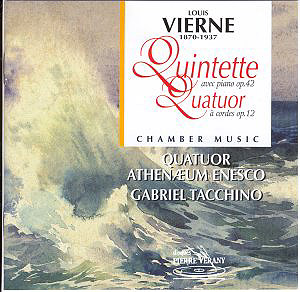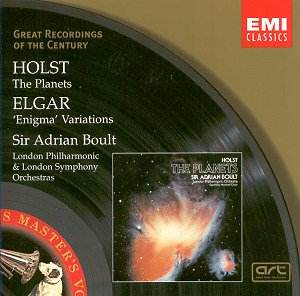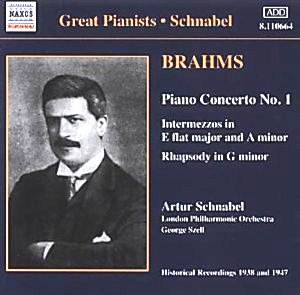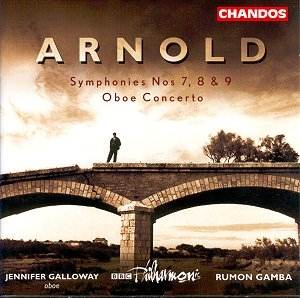 Composer: Louis Vierne
Composer: Louis Vierne
Works: Piano Quintet, Op. 42; String Quartet, Op. 12
Performers: Athenaeum Enesco String Quartet (Constantin Bogdanas & Florin Szigeti, violins; Dan Iarca, viola; Dorel Fodoreanu, cello), Gabriel Tacchino, piano
Recording: Recorded at Adyar Hall, Paris, September 1999
Label: Pierre Verany PV700011
Louis Vierne, primarily celebrated for his organ compositions, steps into the spotlight with this compelling recording featuring two significant chamber works: the Piano Quintet, Op. 42, and the String Quartet, Op. 12. While Vierne’s organ symphonies and the Messe Solennelle have graced concert programs and recordings, these chamber pieces reveal a different facet of his compositional prowess, reflecting both personal tragedy and an evolution in style. The String Quartet, written in 1894 during Vierne’s formative years under the tutelage of Widor, and the Piano Quintet, composed in the shadow of World War I and personal loss, echo the emotional depth of his more celebrated organ works.
The String Quartet, despite Vierne’s own reservations about its significance, is a delightful find. The Athenaeum Enesco Quartet approaches this work with evident verve and clarity, capturing its essential buoyancy and lyrical charm. The first movement’s arching melodic lines, supported by syncopated rhythms, are presented with precision, and the brief Intermezzo serves as a playful counterpoint that contrasts effectively with the emotional weight of the slow movement, marked ‘Andante, quasi adagio.’ Here, the performers adeptly navigate the shifting tempos, conveying a sense of reflective tranquility that is ultimately disrupted by the energetic and somewhat disjointed finale. While the finale’s fugue feels somewhat forced, the Quartet’s spirited performance compensates for these structural inconsistencies, making for an engaging listening experience.
In stark contrast, the Piano Quintet emerges as a masterwork imbued with personal significance and emotional gravitas. Written in the wake of his son’s death during the Great War, Vierne’s intent was to craft a profound tribute to his lost child. The performance by Tacchino and the quartet is marked by a compelling interplay between the piano and strings, with the piano often assuming a leading role. The first movement opens with a brooding introduction that starkly sets the stage for the restless, dramatic themes that follow. Tacchino’s nuanced articulation of the piano’s role is particularly noteworthy, especially in the sublime coda, where the emotional weight culminates in a rapturous resolution. The second movement, initiated by a contemplative viola solo, encapsulates a reflective mood that often erupts into passionate outbursts, seamlessly weaving tension and calm, a testament to both Vierne’s emotional depth and the ensemble’s dynamic interpretation.
The finale’s striking opening chords serve as a clarion call, propelling the music forward with relentless energy that evokes the chaos of war. The ensemble’s ability to balance the climactic moments with the quieter, introspective passages showcases their musical maturity and understanding of Vierne’s intent. The engineering of the recording captures the robust sound of the piano alongside the strings, though at times, the piano’s prominence during climaxes could overshadow the delicate interplay with the strings. This is reflective of Vierne’s own writing, which calls for a strong piano presence, making it a stylistic choice rather than a flaw in balance.
This recording not only broadens the repertoire associated with Vierne but also highlights the emotional and technical complexity of his chamber music. The performances by the Athenaeum Enesco Quartet and Gabriel Tacchino breathe life into these works, revealing the rich emotional landscape that Vierne navigated during his lifetime. For those seeking to explore the depths of French chamber music beyond the conventional canon, this disc stands as a significant and rewarding endeavor, meriting a place in any serious collection.


